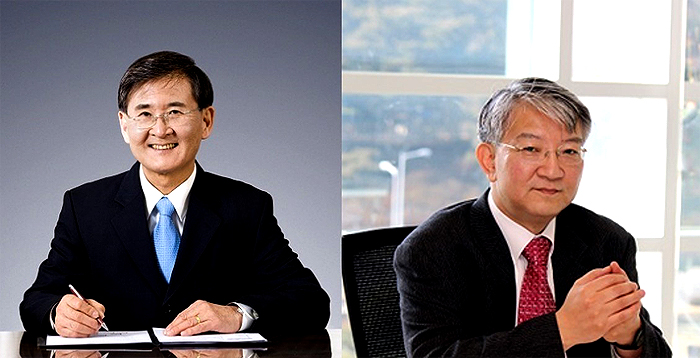people

(President Sung-Mo Kang and Distinguished Professor Sang Yup Lee)
KAIST representatives will join high profile, multi-stakeholder dialogues with global leaders across the world to discuss higher education, science, and technological innovation.
KAIST President Sung-Mo Kang and Distinguished Professor Sang Yup Lee of the Chemical and Biomolecular Engineering Department will participate in the World Economic Forum’s (WEF) Annual Meeting on January 17-20, 2017, in Davos-Klosters, Switzerland.
To be held under the theme “Responsive and Responsible Leadership,” the Annual Meeting will offer global leaders from government, business, academia, and civil society a highly interactive platform to address some of the most pressing issues facing the world today, from climate change, economic inequality, to the Fourth Industrial Revolution and its impact on future employment.
On January 18, President Kang will participate in the Global University Leaders Forum, a community of top 26 universities invited from around the world, and will discuss the relevance of higher education in the context of the Fourth Industrial Revolution. He will also share KAIST’s experiences in developing innovative initiatives to bring future-oriented and creative values into its educational and research programs.
On January 19, at the Global Future Council on Production, President Kang will speak about new technologies taking place in traditional production and distribution systems as introduced by the emergence of rapidly evolving technological advancements, and present KAIST’s endeavors to transform those changes into opportunities.
With an eminent group of scientists, including the Director of the US National Science Foundation France A. Córdova and the Editor-in-Chief Philip Campbell of Nature at the Global Science Outlook session, on January 20, President Kang will discuss key challenges for the global science agenda in the year ahead and examine the role of science in formulating public discussions and polices that will have great impact on society and the lives of people.
Currently, Professor Lee is the founding Co-Chair of the WEF’s Global Future Council, an interdisciplinary knowledge network dedicated to promoting innovative thinking on the future. On January 20, he will share his insights at an independent session entitled “World Changing Technology: Biotech and Neurotech,” briefing the audience on the current state of research, development, and commercialization in these fields, as well as explaining how they will contribute to coping with the Fourth Industrial Revolution.
Professor Lee said, “In recent years, we have seen the world become ever more complex, interconnected, and realigned as it is deeply affected by this unprecedented technological innovations, collectively driving the Fourth Industrial Revolution. One pillar of such innovation will take place in biotechnology and neuroscience, which will help us design solutions to many of global problems such as environment, pandemic diseases, aging, healthcare, and previously intractable illnesses.”
President Kang added, “This year’s Davos meeting will focus on the need to foster leadership at the national, regional, and global level to respond collectively with credible actions to issues of major concern for the sustainable and equitable growth, social inclusion, and human development. KAIST has always been a crucial player in these collaborative efforts, and I am happy to share our insights at the upcoming event.”
-
event KPC4IR Publishes Global Standards Mapping Initiative 2.0
The report highlights South Korea as an early adopter of blockchain in policy and business The KAIST Policy Center for the 4IR (KPC4IR), one of the nine working groups of the Global Blockchain Business Council (GBBC), published the Global Standards Mapping Initiative (GSMI) 2.0, highlighting Korea as an early adopter of blockchain. The report also offers an overview of how blockchain was adopted through an analysis of policy and business cases of South Korea. In partnership with 131 institut
2021-12-21 -
people Professor Sue-Hyun Lee Listed Among WEF 2020 Young Scientists
Professor Sue-Hyun Lee from the Department of Bio and Brain Engineering joined the World Economic Forum (WEF)’s Young Scientists Community on May 26. The class of 2020 comprises 25 leading researchers from 14 countries across the world who are at the forefront of scientific problem-solving and social change. Professor Lee was the only Korean on this year’s roster. The WEF created the Young Scientists Community in 2008 to engage leaders from the public and private sectors with scie
2020-05-26 -
event Long Economic Depressions and Disparities Loom in the Wake of the COVID-19
"Global Cooperation for Managing Data Key to Mitigating the Impacts Around the World" <Full recorded video of the GSI-IF2020> The COVID-19 pandemic will lead to long economic depressions around the entire world. Experts predicted that the prevalent inequities among the countries, regions, and individuals will aggravate the economic crisis. However, crises always come with new opportunities and international cooperation and solidarity will help creating a new normal in the post-corona
2020-04-22 -
policy Korea Policy Center for the Fourth Industrial Revolution Opens
The World Economic Forum’s Center for the Fourth Industrial Revolution opened its Korean affiliate center at KAIST on December 10. The Korea Policy Center for the 4th Industrial Revolution (KPC4IR) will develop policy norms and frameworks for accelerating the benefits of emerging technologies. Many dignitaries including KAIST President Sung-Chul Shin, National Assemblyman Sang-Min Lee, Daejeon City Mayor Her Tae-Jeong, and Managing Director of the WEF Center for the Fourth Industrial
2019-12-10 -
event Global Workshop on the Risks of Emerging Technologies
The Center for Science, Policy and Society (CSPS) at the Graduate School of Science and Technology Policy of KAIST will host the 2017 Global Expert Workshop on the Risks of Emerging Technologies Driving the Fourth Industrial Revolution March 17-18 at the Plaza Hotel in Seoul. At the workshop, experts from public and private sectors at home and abroad will address the socio-economic impacts and implications of the emergence of new technologies that the Fourth Industrial Revolution will bring a
2017-03-16